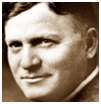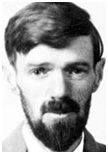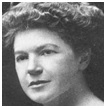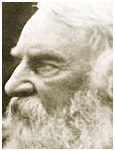|
 |
|
 |
|
|
||
Poetry - Stress and Pain
Max Ehrmann (1872-1945), Desiderata (1927) The American poet (pictured right) emphasizes peaceful co-operation with others:
Go placidly amid the noise and haste, and remember what peace there may be in silence. As far as possible without surrender be on good terms with all persons. Speak your truth quietly and clearly; and listen to others. (first three lines)
Reinhold
Niebuhr (1892-1971), The Serenity Prayer (1943) The American theologian's (pictured right) poem is used at Alcoholics' Anonymous meetings because it says you must accept your past and move on:
God grant me the serenity to accept the things I cannot change; the courage to change the things I can; and the wisdom to know the difference.
Charlotte
Brontë (1816-55), Life The English poet (pictured right) tells us to enjoy life and overcome its problems with courage and hope:
Life, believe, is not a dream So dark as sages say; Oft a little morning rain Foretells a pleasant day. Sometimes there are clouds of gloom, But these are transient all; If the shower will make the roses bloom, O why lament its fall?
Rapidly, merrily, Life's sunny hours flit by, Gratefully, cheerily, Enjoy them as they fly !
What though Death at times steps in And calls our Best away? What though sorrow seems to win, O'er hope, a heavy sway ? Yet hope again elastic springs, Unconquered, though she fell; Still buoyant are her golden wings, Still strong to bear us well. Manfully, fearlessly, The day of trial bear, For gloriously, victoriously, Can courage quell despair ! (complete poem)
Oodgeroo of the Noonuccal (1920-93),
Song The Australian poet (pictured right) says:
Grief is not in vain, it's for our completeness. If the fates ordain love to bring life's sweetness welcome too its pain. (last verse)
D. H. Lawrence (1885-1930), Piano
(1918) The English poet and author of Sons and Lovers (pictured right) says memories can be painful (“I weep like a child for the past” in the last line).
So now it is vain for the singer to burst into clamour With the great black piano appassionato. The glamour Of childish days is upon me, my manhood is cast Down in the flood of remembrance, I weep like a child for the past. (last verse)
Ella Wheeler Wilcox (1850-1919), Solitude (1883) The American poet (pictured right) tells us that pain and death have to be endured. But don’t share your problems, because other people have enough of their own:
Laugh, and the world laughs with you; Weep, and you weep alone. For the sad old earth must borrow it's mirth, But has trouble enough of its own... (lines 1-4)
Succeed and give, and it helps you live, But no man can help you die. There is room in the halls of pleasure For a long and lordly train, But one by one we must all file on Through the narrow aisles of pain. (lines 19-24)
Ella Wheeler Wilcox , Courage (1883) In this poem Wilcox says face your problems with courage.
There is a courage, a majestic thing That springs forth from the brow of pain, full-grown, Minerva-like, and dares all dangers known, And all the threatening future yet may bring; Crowned with the helmet of great suffering, Serene with that grand strength by martyrs shown, When at the stake they die and make no moan, And even as the flames leap up are heard to sing.
A courage so sublime and unafraid, It wears its sorrows like a coat of mail; And Fate, the archer, passes by dismayed, Knowing his best barbed arrows needs must fail To pierce a soul so armoured and arrayed That Death himself might look on it and quail. (complete poem)
William Wordsworth (1770-1850) Ode:
Imitations of Immortality The English poet (pictured right) describes how spiritually painful life’s experiences can be:
To me the meanest flower that blows can give Thoughts that do often lie too deep for tears. (last two lines)
William Blake (1757-1827), Auguries of
Innocence (1803) The English poet (pictured right) says that joy and woe go together in life:
Joy and woe are woven fine, A clothing for the soul divine. (from verse 17)
Lord Byron (1788-1824), Childe Heralde’s
Pilgrimage (1812 –18) The English poet (pictured right) reminds us of the pain of old age:
What is the worst of woes that wait on age? What stamps the wrinkle deeper on the brow? To view each loved one blotted from life's page, And be alone on earth, as I am now. (selected lines)
In other words, “breathe when I expire” in line 5 below.
But I have lived, and have not lived in vain; My mind may lose its force, my blood its fire; And my frame perish even in conquering pain; But there is that within me which shall tire Torture and Time, and breathe when I expire; Something unearthly, which they deem not of, Like the remember'd tone of a mute lyre, Shall on their soften'd spirits sink, and move In hearts all rocky now the late remorse of love. (selected lines)
Henry Wadsworth Longfellow (1807-82), The Light of Stars
(1839) The American poet (pictured right) tells us to face our problems with courage:
O fear not in a world like this, And thou shalt know erelong, Know how sublime a thing it is To suffer and be strong. (last verse)
Henry Wadsworth Longfellow, The Rainy Day In this poem Longfellow says you should look on the bright side of life, however difficult it is.
My life is cold, and dark, and dreary; It rains, and the wind is never weary; My thoughts still cling to the mouldering Past, But the hopes of youth fall thick in the blast, And the days are dark and dreary.
Be still, sad heart! and cease repining; Behind the clouds is the sun still shining; Thy fate is the common fate of all, Into each life some rain must fall, Some days must be dark and dreary. (last two verses)
Elizabeth Barrett Browning (1806-61), The Little
Cares Take time to appreciate the good things in life like the beauty of nature, says the English poet (pictured right):
The little cares that fretted me, I lost them yesterday Among the fields above the sea, Among the winds at play; Among the lowing of the herds, The rustling of the trees, Among the singing of the birds, The humming of the bees. (first verse)
Thomas Bracken (1843-98), Not Understood
(1879) The Irish-born New Zealander (pictured right) says pain is eased by understanding and kindness:
O God! that men would see a little clearer, Or judge less harshly where they cannot see! O God! that men would draw a little nearer To one another, -- they'd be nearer Thee, And understood. (last verse) |
|
|
||
|
|
||
| Copyright © wisdomtowin.com 2025 All Rights Reserved | ||
|














